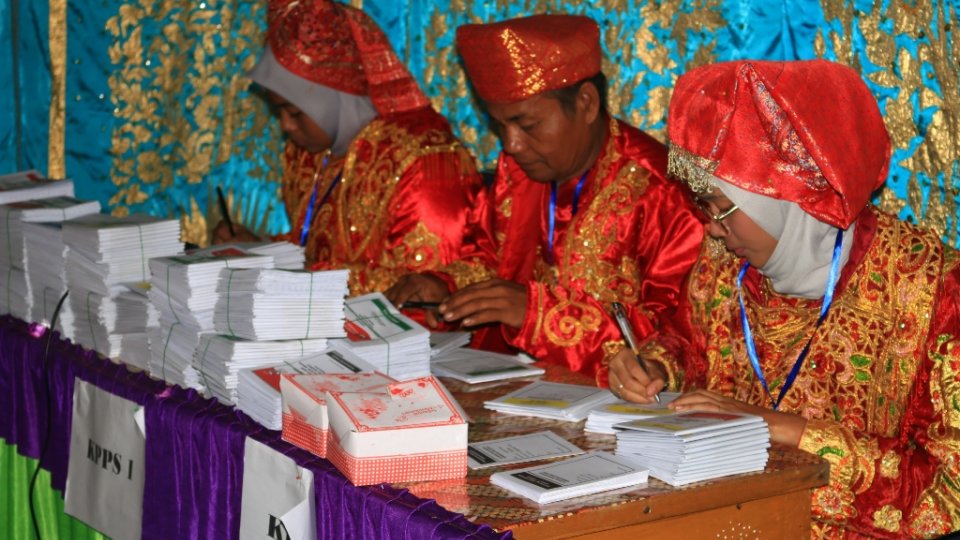
Poll workers in West Sumatra during the 2019 elections in Indonesia. The workers are wearing Minang wedding clothes, saying they did so in order to attract attention and increase voter turnout. Photo credit: Wikimedia/City government of Pariaman (public domain).
KEY FACTS
Freedom House Rating
Partly Free
Government Type
Presidential Republic
Population
267 million |
UPCOMING ELECTIONS
Partial Local and Provincial Elections
December 9, 2020
Partial Local and Provincial Elections
December 2022 (due)
General Elections
April 2024 (due) |
PAST ELECTIONS
General Elections
April 17, 2019
Local and Provincial Elections
December 9, 2015 |
Indonesia will hold local and provincial elections on December 9, 2020. In these elections, Indonesians will elect governors in nine of Indonesia’s 34 provinces (West Sumatra, Jambi, Bengkulu, Riau Islands, Central Kalimantan, South Kalimantan, North Kalimantan, North Sulawesi, and Southeast Sulawesi), plus regents in 224 districts, mayors in 37 cities and 32 provinces across Indonesia. There are more than 100 million eligible voters.
Some have called for these elections to be postponed due to COVID-19, but the government has said that they will proceed on schedule.
Political Context
Indonesia’s national political context is evolving.
In Indonesia’s April 2019 election – the biggest single day of voting in the history of the world – incumbent Joko Widodo (Jokowi), widely seen as a reformer, defeated challenged Prabowo Subianto for the presidency in an election deemed free and fair by the international community. However, Prabowo didn’t accept the results, and in addition to challenging them in court, he urged his supporters to take to the streets. Rioting subsequently ensued. Prabowo ultimately accepted the results, but tensions remain, particularly regarding the role of religion in politics.
Ben Bland at the Financial Times sums up Indonesia – and Jokowi’s presidency – as follows: “Jokowi’s presidency is not just a story of personal paradoxes. He is struggling with the fundamental contradictions of the sprawling, diverse Indonesian nation, which was forged in a hurry 75 years ago from the arbitrary limits of Dutch colonial expansion. Like Indonesia, Jokowi is caught between democracy and authoritarianism, Islam and pluralism, openness and protectionism.”
Curated News and Analysis
Noory Okthariza, East Asia Forum (October 13, 2020): Jokowi joins Indonesia’s dynastic trend
Ben Bland, Financial Times (September 22, 2020): Dream state: Widodo struggles to build his vision for Indonesia
Markus Junianto Sihaloho, Lenny Tristia Tambun, and Yustinus Paat, Jakarta Globe (September 21, 2020): Palace Insists on Holding Elections on Schedule Despite Soaring Covid-19 Cases
Jonah Blank, Foreign Affairs (April 22, 2019): What Jokowi’s Reelection Means for Indonesia
21votes does not necessarily agree with all of the opinions expressed in the linked articles; rather, our goal is to curate a wide range of voices. Furthermore, none of the individuals or organizations referenced have reviewed 21votes’ content. That is to say, their inclusion should not be taken to imply that they endorse us in any way. More on our approach here.
Updated October 18, 2020
Related
Indonesia Provincial and Local Elections: December 9, 2020
Leave a Comment
Last Updated: October 19, 2020 by 21votes
Poll workers in West Sumatra during the 2019 elections in Indonesia. The workers are wearing Minang wedding clothes, saying they did so in order to attract attention and increase voter turnout. Photo credit: Wikimedia/City government of Pariaman (public domain).
Freedom House Rating
Partly Free
Government Type
Presidential Republic
Population
267 million
Partial Local and Provincial Elections
December 9, 2020
Partial Local and Provincial Elections
December 2022 (due)
General Elections
April 2024 (due)
General Elections
April 17, 2019
Local and Provincial Elections
December 9, 2015
Indonesia will hold local and provincial elections on December 9, 2020. In these elections, Indonesians will elect governors in nine of Indonesia’s 34 provinces (West Sumatra, Jambi, Bengkulu, Riau Islands, Central Kalimantan, South Kalimantan, North Kalimantan, North Sulawesi, and Southeast Sulawesi), plus regents in 224 districts, mayors in 37 cities and 32 provinces across Indonesia. There are more than 100 million eligible voters.
Some have called for these elections to be postponed due to COVID-19, but the government has said that they will proceed on schedule.
Political Context
Indonesia’s national political context is evolving.
In Indonesia’s April 2019 election – the biggest single day of voting in the history of the world – incumbent Joko Widodo (Jokowi), widely seen as a reformer, defeated challenged Prabowo Subianto for the presidency in an election deemed free and fair by the international community. However, Prabowo didn’t accept the results, and in addition to challenging them in court, he urged his supporters to take to the streets. Rioting subsequently ensued. Prabowo ultimately accepted the results, but tensions remain, particularly regarding the role of religion in politics.
Ben Bland at the Financial Times sums up Indonesia – and Jokowi’s presidency – as follows: “Jokowi’s presidency is not just a story of personal paradoxes. He is struggling with the fundamental contradictions of the sprawling, diverse Indonesian nation, which was forged in a hurry 75 years ago from the arbitrary limits of Dutch colonial expansion. Like Indonesia, Jokowi is caught between democracy and authoritarianism, Islam and pluralism, openness and protectionism.”
Curated News and Analysis
Noory Okthariza, East Asia Forum (October 13, 2020): Jokowi joins Indonesia’s dynastic trend
Ben Bland, Financial Times (September 22, 2020): Dream state: Widodo struggles to build his vision for Indonesia
Markus Junianto Sihaloho, Lenny Tristia Tambun, and Yustinus Paat, Jakarta Globe (September 21, 2020): Palace Insists on Holding Elections on Schedule Despite Soaring Covid-19 Cases
Jonah Blank, Foreign Affairs (April 22, 2019): What Jokowi’s Reelection Means for Indonesia
21votes does not necessarily agree with all of the opinions expressed in the linked articles; rather, our goal is to curate a wide range of voices. Furthermore, none of the individuals or organizations referenced have reviewed 21votes’ content. That is to say, their inclusion should not be taken to imply that they endorse us in any way. More on our approach here.
Updated October 18, 2020
Share this:
Related
Category: Overview Tags: Indonesia